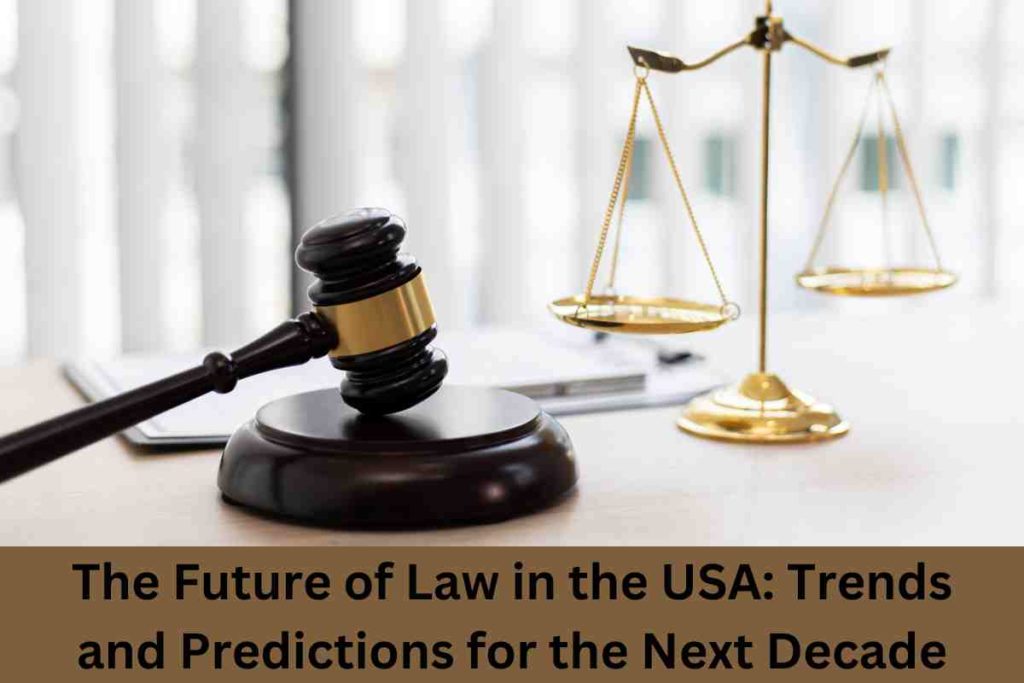The Future of Law in the USA: Trends and Predictions for the Next Decade

The Future of Law in the USA: Trends and Predictions for the Next Decade:- The legal landscape in the United States is evolving at a rapid pace, with numerous factors contributing to its continuous transformation. As we venture further into the 21st century, the intersection of technology, societal norms, and legal principles is likely to create a unique and complex legal ecosystem. Understanding the trends and predictions for the next decade is essential for legal professionals, policymakers, and the general populace to navigate the intricacies of the law and ensure justice and fairness in society. This article delves into the various dynamics that will shape the future of law in the USA, offering a comprehensive insight into what lies ahead.
Technological Advancements and Law
Artificial Intelligence (AI) and Machine Learning (ML) are making significant strides in the legal domain, enabling unprecedented efficiency and accuracy in legal research, contract analysis, and prediction of legal outcomes. The adoption of AI-powered legal technology will continue to rise, offering sophisticated tools for case management, legal analytics, and automation of routine legal tasks. This will streamline legal processes and free up legal practitioners to focus on more nuanced and complex aspects of law.
Moreover, Blockchain technology is poised to revolutionize the way contracts are created, verified, and enforced through smart contracts. These self-executing contracts with the terms directly written into code will significantly reduce the reliance on intermediaries, ensuring a seamless and transparent contractual process.
Online Dispute Resolution (ODR)
The digital realm is becoming a new frontier for resolving disputes. Online Dispute Resolution (ODR) is an emerging field that utilizes digital platforms and technologies to facilitate the resolution of disputes outside traditional courtrooms. As e-commerce and online interactions continue to increase, the demand for ODR platforms will skyrocket, providing a fast, cost-effective, and accessible means for individuals and businesses to resolve conflicts.
Legal Education and Practice
The exigencies of modern legal practice necessitate a reformation in legal education. Future legal education will emphasize interdisciplinary studies, integrating courses on technology, data analytics, and other pertinent fields to equip aspiring lawyers with the requisite skills for a modern legal landscape. Additionally, Continuing Legal Education (CLE) programs will play a crucial role in ensuring that practicing attorneys stay abreast of the evolving legal and technological trends.
The practice of law itself will experience a shift towards more flexible and remote working arrangements, facilitated by digital technology. Virtual law firms and digital platforms will provide a platform for legal practitioners to offer their services online, expanding their reach and providing greater accessibility to legal services for the public.
Regulatory Changes and Legal Ethics
The rapid advancement of technology and its integration into the legal sector will necessitate renewed regulatory frameworks to ensure the ethical practice of law. Regulatory bodies will need to adapt to the changing landscape by developing new guidelines and ethical standards to address the challenges and opportunities presented by technological innovations.
Access to Justice
Enhanced access to justice is a fundamental aspiration that underpins these legal trends. The integration of technology into the legal domain, the evolution of online dispute resolution, and the modernization of legal education and practice are all directed towards creating a more accessible, efficient, and equitable legal system.
Conclusion
The future of law in the USA is teeming with potential, driven by technological innovations, evolving societal norms, and the adaptability of the legal fraternity. As we move forward, the intertwining of law, technology, and society will continue to foster a dynamic legal environment, heralding a new era of justice and legal practice.






